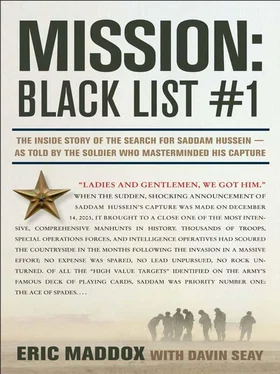What mattered now was not who had once been in charge. The regime had been turned upside down and there was a whole new cast of players. To catch them, it would no longer work simply to follow the old chain of command. It didn’t exist anymore. Instead I needed to listen to what the detainees and informants were telling me. Clues to piecing together the new power structure, what was happening in the street in real time, could only come from them.
There were bad guys out there for sure. We heard their incoming mortars and sniper fire every night. But maybe we didn’t really know who they were.
By early September I was interrogating on a continuous basis. My workday usually started at 1300 and continued until 0200 or later. I had a full range of detainees, usually those who were suspected of either having been involved in or were planning an attack on U.S. forces. But regardless of what they had been brought in for, the techniques I used, and the thinking behind them, were the same.
More often than not there was a lack of hard evidence to prove a prisoner was involved in the insurgency. For that reason, most of them didn’t believe that they were going to prison, just because they’d been arrested. It was my job to catch them in a lie if I could. That gave me leverage. If I could prove they were lying, they could be held indefinitely. But the reality in war was that I didn’t have to make my case to a judge or jury. We weren’t in the United States and my job wasn’t to hand down justice. Frankly, I didn’t care whether they were guilty or innocent of the crimes with which they’d been charged. Every prisoner I interrogated started out being guilty of one thing: not helping me yet. It was up to me whether they would go free. And the only way that would happen was when they proved themselves helpful.
I needed intelligence. It didn’t matter to me whether I was getting it from an actual insurgent or a completely innocent detainee who happened to possess important information. There was no superior standing over my shoulder, watching my every move. There was no central database that my information was being fed into. In that guesthouse, it was strictly between the prisoner and me.
But I was also beginning to reach beyond the detainees in my search for good information. For that reason I developed a working relationship with the 4th ID’s Tactical Humint Teams—the THTs. About twenty of these Tactical Human Intelligence Teams were scattered around the city. Usually consisting of raw but enthusiastic young interrogators and counterintelligence specialists, they were tasked with developing leads wherever they could find them. One THT, for instance, was posted at the front gate of the palace compound where civilians would show up with requests or complaints. Another group was stationed at the governor’s office. While they rarely came up with actionable information on HVTs, the THTs could still provide a good picture of what was happening on the ground in Tikrit. Rich regularly met with them to cull their intelligence for anything useful. But he had to be careful. The last thing he wanted to do was give the task force the impression that they were chasing leads supplied by a bunch of boy scouts.
The rest of the team, especially Jeff, had absolutely no use for these guys, but I could see that they were doing all they could under difficult circumstances. Mostly National Guard reservists with limited training and no experience in intelligence gathering, the five-man THTs tried their best to sort through the informants who came in to barter or sell information. They were totally unequipped for the task. But I made a point of meeting with them and their sources when I had the chance. You never knew where a good lead might come from. Or where it might take you.
One THT in particular had been focused on gathering information about bodyguards. A young reservist from Utah, Sergeant Olsen, headed up the unit. Olsen was eager to please and had brought us a few informants that he thought were particularly promising. One of them claimed to know the leader of a local insurgent cell. His name was Farris Yasin Omar Al-Muslit.
That rang a bell. I remembered back to my interrogation with Taha, the chubby, sweaty detainee. He had tipped me to the link between Saddam’s servant and Muhammad Haddoushi’s driver. But there was something else about that session that I recalled now. Taha’s brother was named Farris Yasin. He was another in the long line of Al-Muslits who kept popping up on the radar.
“Who does Farris Yasin work with?” I asked Sergeant Olsen’s source.
“He has a group in the north,” he replied. “It is about twenty kilometers from Al-Alam, which is my village.”
I knew Al-Alam, at least by reputation. It was across the Tigris River from Tikrit and was surrounded by rich farmland awarded to key Saddam supporters. It was increasingly clear that Al-Alam and other towns on the east side of the river were hot-beds of insurgency. Most of the detainees that were brought to me were from Tikrit. As inadequate as they were, THTs like Sergeant Olsen’s were some of my few links to what might be going on east of the river.
I wasn’t sure where all this was leading, but I wanted to follow it as far as I could. Unfortunately Jeff’s short fuse had already burned down. “Okay,” he said after the session. “Where exactly did that get us?”
He had a point. We had some vague indications of an insurgent group working in an area where we rarely netted prisoners. But I didn’t want to let it go yet.
“It might be good to talk to people from the other side of the river,” I suggested.
“Then check with Chris,” Jeff snapped back. “He runs sources out of there. You can sit in on his meetings.”
The fact was that, under Chris, the case officer, we already had informants in Al-Alam and elsewhere. What we didn’t have was a system for sharing the information he pulled in. I didn’t know what he was doing and vice versa. We were improvising, doing the best we could with a patchwork of sources and prisoners. What we needed was to pool what we were getting, identify areas of overlap, and begin to build a broader picture of the activities and main players in the region. Jeff brought Chris and me together and decided that we would sit in on each other’s interrogations and informant debriefings whenever possible. Slowly but surely, a coordinated effort was beginning to take shape.
But progress was agonizingly slow. Even with our improved information sharing, the quality of intelligence we were getting was consistently poor. In the month of September alone, the team went out on something like a half dozen hits just looking for Muhammad Haddoushi. They were all dry holes. There were another half dozen strikeouts for other assorted targets and at least ten raids that failed to turn up Izzat Ibrahim Al-Duri, Saddam’s senior military adviser, the King of Clubs on the deck of cards, Black List #6.
If Al-Duri weren’t still at large and suspected to be hiding somewhere in the Tikrit area, I’m not even sure that the team would still have been stationed there. He was the kind of HVT that attracted a lot of attention and there was a real premium put on rolling him up: to be exact, a $10 million bounty for information leading to his arrest. It sometimes seemed that everything else we were doing short of finding Al-Duri was just to keep us in town. We were still going on hits and collecting information, but the focus was on finding this one card in the Black List deck.
But when it came to capturing him, or any other targets, High Value or otherwise, we kept coming up short. The team blamed the intelligence collectors for the frustrating lack of success. I took my share of the blame for the lack of good information, even though their expectations of me weren’t very high to begin with. But in their own way, guys like Chris were as dedicated as the shooters. They never gave up, even when, time after time, the results were discouraging.
Читать дальше












